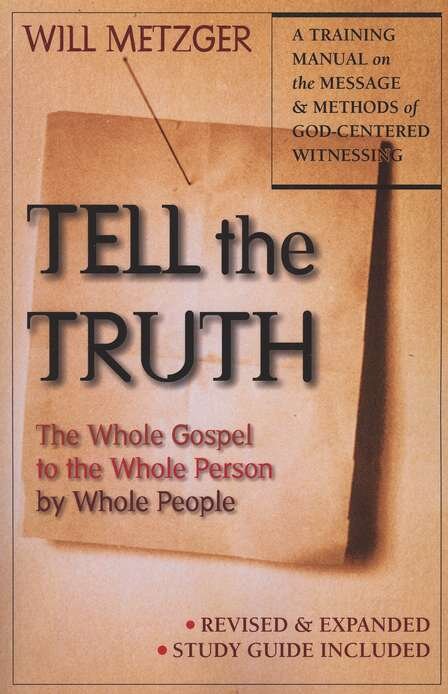Will Metzger, Tell the Truth: The Whole Gospel to the Whole Person by the Whole People. Revised and Expanded. IVP Books, 2002.
Referenced in: Approaches to Evangelism – Missionally Responsive/Evangelical
LifeandLeadership.com Summary
Metzger comes out of a background of campus ministry with the InterVarsity Christian Fellowship, and presents a strongly conservative viewpoint on evangelism emphasizing God’s authority and deep conviction leading to repentance. It contrasts to views such as “influence through good deeds and good conversations,” “inviting others to dance” (Brian McLaren, More Ready Than You Realize, p. 15), “exchanging of journey narratives” (Peter Rollins, How [Not] to Speak of God, p. 54) and “reverse evangelism” (Gibbs and Bolger, Emerging Churches, p. 131).
Metzger sees evangelism with an aim toward others’ conversion as the Gospel confronts one’s sin and separation from God, leading to a clear decision of faith and repentance. In this sense, Metzger is in the company of popular authors such as John Piper and Mark Dever.
This leads Dever to say that Tell the Truth “may be the best single book on evangelism that I’ve read. Metzger makes it clear both theologically and practically that our evangelism should not be ‘man-centered’ but ‘God-centered.’” (See appendix in Dever, The Gospel and Personal Evangelism).
The essential tone of this book is that modern approaches to evangelism minimize God’s position as creator and sovereign ruler, the shocking news of God’s displeasure with sin, the awful condition of man’s separation from God, the sobering effect of the conviction of the Holy Spirit, and the response of the whole person in mind, emotion, and will toward a radical Christian conversion. He quotes J. I. Packer, that “to be convicted of sin means not just to feel one is an all-around flop but to realize that one has offended God.” Outside of this conviction, unbelievers will not sense the urgency to repent and trust in the cross of Christ with their whole beings. As Metzger says:
Our desire must be nothing less than to see the whole individual converted. We are looking to God for changed persons, not just a response from one segment of a personality. God’s regenerative work is a thorough renewing that involves all the faculties of a mind, emotions and will. Scriptural language calls this a ‘new creation’, a ‘new birth’. People are either saved or lost. To weaken this radical but scriptural cleavage of mankind by suggesting a third category for people is an attack on the biblical doctrine of regeneration. There is no such thing as being a half Christian – for instance, being a Christian but not a ‘Spirit-baptised’ Christian’; being a ‘Christian’ but not accepting Jesus as Lord; or being a Christian but living a life continually characterised by being carnal (spiritual adultery).
Metzger presents a “plea that we taste and see the difference between modern evangelism with its methods / me-centered gospel and the historic God-centered gospel.” He offers a definition of the gospel through a rubric of three contrasts:
- Whole Gospel vs. Shrunken Gospel
- Message-Centered vs. Method-Centered
- God-Centered vs. Me-Centered
The left side of each of the polarities above is preferred over the right, because the expressions on the right present only pieces of the gospel, “partial truths” of a “packaged gospel,” that fail to call the whole person to submit to God’s authority in repentance and faith. He offers an extensive “Come Home” method and diagram that illustrates what he believes to be a more faithful understanding of the evangelistic process. The diagram is probably too complex for easy use, but it does a good job providing a “birds-eye” view of his understanding of true evangelism. Metzger also presents lengthy discussions on how all of this relates to the biblical teachings on grace and worship. Considerable appendices provide training materials for learning the God-centered approach to evangelism, using the “Come Home” diagram, and following a study guide in group/class settings.
From the Publisher
Will Metzger’s training manual on the message and methods of God-centered evangelism is now in its third edition! This revised and expanded version of the original guide published in 1981 is written to address the concern that many Christians, entrusted with the gospel message, have forgotten the message and their responsibility to accurately convey it. The recovery of a God-centered and grace-centered gospel is imperative, says Will Metzger. In the third edition of his critically-acclaimed training manual he expands on the topics of grace and worship. And he emphasizes the centrality of sovereign, saving grace that completely exalts God. In addition, he offers a narrative approach to witnessing with the story “Come Home,” training materials for Christians who want to learn God-centered evangelism, and a study guide on evangelism suitable for individuals or groups. More than ever, is ready to serve the church as a comprehensive, accessible and effective guide to God-centered evangelism.
About the Author
Metzger has been a campus minister at the University of Delaware since 1965, where he serves with InterVarsity Christian Fellowship and Christian InterAction (a church and campus connection). His evangelism ministry has taken him to every continent, and he has witnessed to people from varied nationalities both on campus and through a church that he pastored.
***For additional information on this resource, including reviews, click the bookstore links. Check the reference at page top or the links below for resource guides on related topics.***
Related Areas
See Other Resources on Evangelism:
See Resources on Over 100 Areas of Ministry Leadership:


